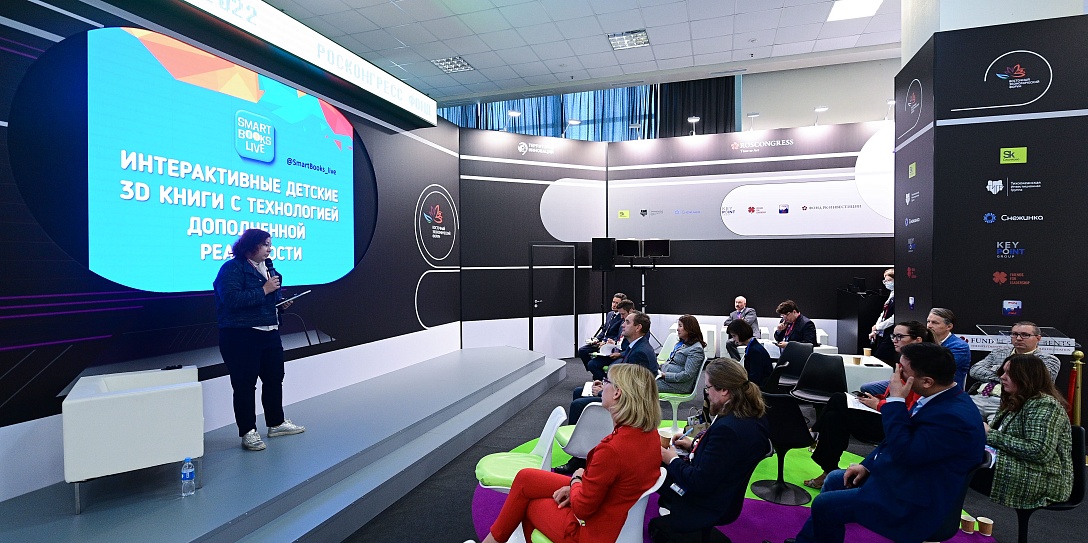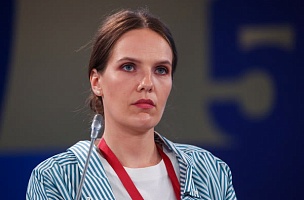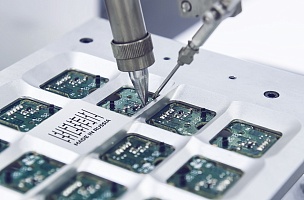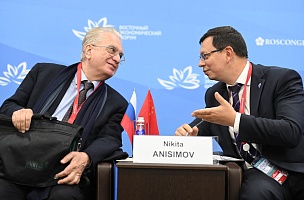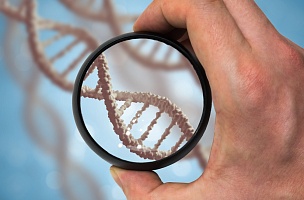The 7th Eastern Economic
Forum featured a pitch session by Innovation Space participants. This platform,
which has become traditional for major Roscongress Foundation events, was
created to promote high-tech Russian companies. This time, projects were
presented by residents of the Skolkovo Foundation and the Russky and Yakutia Technoparks.
13 start-ups were assessed based on parameters such as novelty, feasibility, commercialization
and team professionalism.
The expert jury included Alexander
Borisov, Director, IT Park High Technology Park; Andrey Zubkov, Managing
Director, Voskhod Investment Foundation; Anna Struchkova, General Director,
Agency for Investment Promotion and Export Support of the Republic of Sakha (Yakutia);
and Sergey Bolshakov, Investment Director, RK-Investments Foundation. The
session was moderated by Kirill Kaem, Senior Vice-President for Innovations,
Skolkovo Foundation.
“Innovation Space is probably the
most interesting place at the Eastern Economic Forum, because it’s here that
people present live projects that they believe in and are delivering on,” noted
Kirill Kaem in opening the pitch session.
The first to present his project was Yakut
entrepreneur Afanasy Argunov. The Sciberia integrated software is already being
used in a number of hospitals in the Republic of Sakha (Yakutia) to analyse medical
images using machine learning technology. The Sciberia Lungs software module, created
to examine the lungs, is capable of diagnosing COVID-19 with a high degree of
accuracy. “Our software speeds up the decision-making process, enabling doctors
to devote more time to studying each specific case,” noted Afanasy Argunov.
Leonid Klarov presented
another medical IT start-up – the
ReRad collaborative platform for doctors. It currently has over 800 specialists
in its community who can not only share their expertise with one another but
can also drive efficiency thanks to the software’s embedded data mining
modules.
The
medical exoskeleton presented by Exosystems restores the musculoskeletal
functions of people with paralyzed lower limbs. Vadim Tamozhny, who pitched the
project, drew the audience’s attention to the fact that the device is made entirely
from Russian-made components and has a greater bearing capacity than foreign
counterparts, yet is several times cheaper.
This
advantage is shared by the VeDroid industrial disinfecting and cleaning robot
presented by serial entrepreneur Nikolay Potapov. This product aroused much interest in customers even
at its assembly stage. It is currently in use not only in Yakutia but in other
regions of Russia and even Kazakhstan.
Another project of potential interest to
cleaning companies is the EM-Active biological disinfectant by Innovatika. According
to its CEO, Ekaterina Evseyeva, unlike conventional disinfectants, this product
uses beneficial microorganisms to suppress pathogens and is therefore
completely harmless to humans and the environment.
A
number of the projects presented at Innovation Space were linked to the sea,
which is no surprise given its significance to the Far Eastern economy. Alexey
Titov, General Director of Marine Robotic Systems, spoke about his unique
innovative shipbuilding project – a marine surface robot (trimaran) developed by
Karfidov.Lab and the Tatishchev Astrakhan State University. The robot is
capable of performing a wide range of tasks: collecting and transmitting data
for industrial and environmental monitoring, searching for bioresources, carrying
out geophysical or meteorological research. Its hybrid power unit provides it
with up to 12 months’ autonomous navigation.
Conversely,
the Sea Shepherd robot from Hydrobionics’ Pneumon series was created for a
highly specialized task – protecting fishing vessels’ dragnets. The device
looks like and imitates the sounds of killer whales, scaring away seals and
other marine predators that inflict losses on fishermen. According to Artur
Mayss, the project’s owner, it will increase the productivity and
sustainability of fishing.
The airborne laser scanning technology developed
by AGM Systems is useful for studying the terrain of
shallow coastal areas or scattered hydrographic features over a large area. “Typically,
a team of surveyors can measure an area of 4 hectares a day. Our technology
increases their productivity by 200 times,” said project director Vladimir
Brusilo.
Pud
Timofeev, the director of the Yakutsk Boiler Plant, presented two projects to
the experts: the Liepsnele Arctic and
Kamelek solid fuel boilers, capable of many hours of combustion in Yakutia’s minus 50°C temperatures, and a modular electric bike capable of
changing its configuration.
Another project from Yakutia is the Silvan
forest fire deterrent system, which solves another problem for the world’s
largest administrative entity. Gavriil Fedorov, director of the Smart Unit
project, noted that active negotiations on the rollout of the system are also
underway with other Russian regions.
Vladivostok’s
Kirill Kovalevskiy, CEO at Innofarm-DV – one of the most active participants of
the Innovation Space events at EEF – presented a highly automated hardware and
software system for growing leafy greens and strawberries. He claimed that the
system’s embedded intelligent assistance functions will enable his vertical
farm to become a “digital agronomist” yielding a harvest of 1.5 tonnes of herbs
a year.
The
media industry was represented at Innovation Space by two start-ups. The Extra
Cinema projector and digital platform enables films to be shown on the big
screen in the most remote and sparsely populated corners of Russia, where
building traditional cinemas is unviable. Project manager Petr Chiryayev estimates the total
capacity of the Russian market at 100,000 projectors.
Finally, Taisiya Tarabukina presented the
SmartBooks.live start-up – interactive 3D children’s books with AR elements.
After the pitch session, first place was awarded
to the Sciberia project, second to AGM Systems and third to Marine Robotic
Systems, granting all three the opportunity to speak at the Congress of Young
Scientists, to be held in December 2022 at the Sirius Park of Science and Art.


